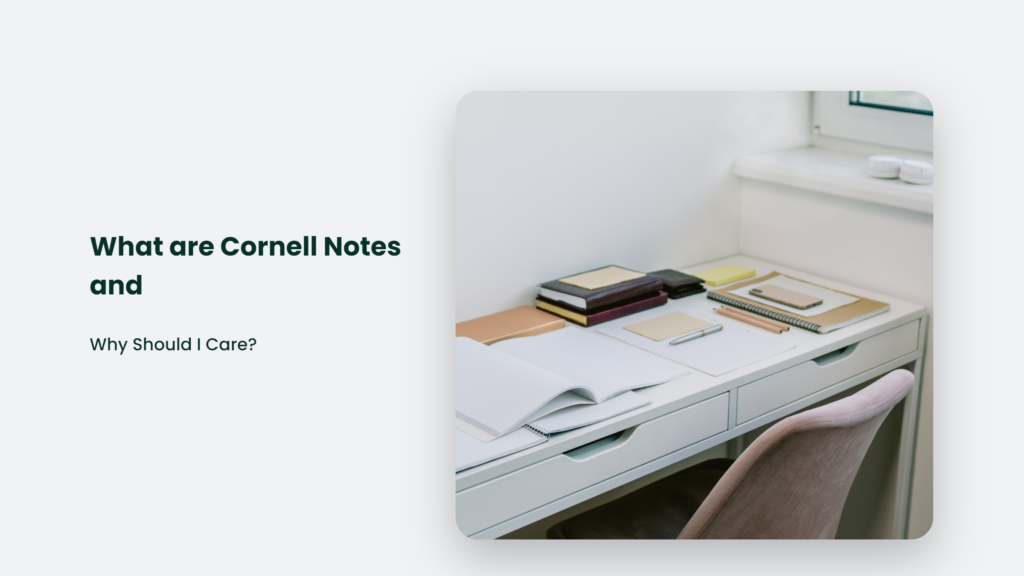

What are Cornell Notes and Why Should I Care?

As Seen On
Raise your hand if you’ve ever sat in a boring-ass lecture hall trying not to fall asleep while some monotone professor drones on about god knows what. Yeah, I can see a lot of hands in the air. We’ve all been there.
It’s easy to zone out during lectures. Who can focus for 50 minutes while someone reads PowerPoint slides in a Ben Stein voice? F*ck that. But unfortunately, most of us need to pass our classes, which means somehow absorbing all that useless information.
It is where Cornell notes come to the rescue.

What are Cornell Notes?
Cornell notes are a special note-taking system developed in the 1950s by Walter Pauk at Cornell University. Hence the name. The idea is to divide your page into three sections to help you condense and organise lecture notes.
Here’s how it works:
- On the right side, you have a 2-3 inch column called the “cue column.”
- On the left, you have a bigger 6-inch column called the “note-taking column.”
- At the bottom, you have a summary section.
While the professor is droning on, you take notes in the left column. Then, after class, you go back and write keywords and questions in the cue column related to those notes. Finally, you summarise the whole thing at the bottom.
It’s basically a way to turn scattered lecture notes into an organised study guide.
Why Use Cornell Notes?
Good question, young grasshopper. Here’s why Cornell notes are the sh*t:
They force you to listen actively.
When passively taking notes, it’s easy to zone out and go on autopilot. But with Cornell notes, you must consider the key concepts and summarise the main ideas. It helps cement the information in your brain.
They help with exam prep.
The cue column gives you built-in study questions. And the summary helps review the key points. So, your notes naturally turn into a study guide without extra work.
They improve your retention.
Research shows we remember more when we actively engage with material. Cornell notes force you to synthesise ideas and identify key takeaways, which boosts retention.
They keep your notes organised.
There’s nothing worse than trying to study from scattered notes scribbled randomly on a page. With Cornell notes, everything is neatly organised by topic, which makes studying a shit-ton easier.
They help if you miss class.
If you skip class to sleep off a wicked hangover, you can easily borrow someone’s Cornell notes to catch up on the lecture. The organised format allows you to get up to speed quickly.
They can improve your grades.
Studies show students who use Cornell notes tend to perform better on exams than those who don’t—getting better grades with less effort. Sign me up!
How to Take Cornell Notes Like a Boss
By now, you’re probably thinking, “Wow, Cornell notes are the greatest f*cking thing since sliced bread! Teach me your ways, oh knowledgeable one.”First, grab your pen and paper. Okay, got ’em? Good. Now, let’s do this:
Step 1: Draw the columns
Start by dividing your page vertically into three sections:
- Cue column on the right (2-3 inches wide)
- Note-taking column on the left (6 inches wide)
- Summary section at bottom (2-3 inches high)
Step 2: Take notes during class
As the lecture goes on, take notes in the left column. Write concisely and focus on key facts, concepts, and ideas. Skip the fluff.
Step 3: Review and summarise after class
After the lecture, start processing your notes:
- Label topics and make your notes more readable
- Write keywords, main ideas, and questions in the cue column
- Summarise the main points at the bottom
It helps reinforce the content while it’s still fresh.
Pro Cornell Note-Taking Tips
You’ll get better at distilling lectures down to their essence with practice. But here are some pro tips to take your Cornell note game to the next level:
- Use abbreviations and symbols – Shorten common words and phrases to keep up
- Highlight important information – Use colours and asterisks to identify key points
- Review your notes ASAP – Fill in the columns right after class when it’s fresh
- Write legibly – If you can’t read your notes later, they’re useless
- Organise by topic – Date each lecture and leave space between topics
- Compare notes with classmates – Fill in gaps by exchanging notes
- Type up your notes – Rewriting them reinforces the material
Cornell Notes Don’t Work for Everyone
Now pay attention because this is some real sh*t. Cornell notes are awesome for many students. But nothing is one-size-fits-all.
Some people simply think and learn differently. If Cornell notes don’t vibe with your learning style, don’t force it. The key is experimenting and finding a note-taking method that works for you.
The goal is to engage with course material in a way that makes sense for your brain. Cornell notes are one strategy, but don’t be afraid to get creative and hack your system.
The worst thing you can do is mindlessly copy notes without processing the information. Figure out how you learn best and own that sh*t.
Frequently Asked Questions:
Do I have to use the three-column format exactly?
Nah, you can tweak the format to suit your needs. The key elements are summarizing, identifying key concepts, and organizing.
Can I take Cornell notes on my laptop?
Definitely. Just divide your document into three sections. Typing your notes can help drive home the material.
What if my professor talks too fast for me to take Cornell notes?
It takes practice to condense info on the fly. Consider recording lectures as a backup until you get the hang of it.
Wrap-Up: Cornell Notes Can Make Your Study Life Suck Less
At first glance, Cornell notes seem like just another academic hoop to jump through. But give them a chance, and they’ll grow on you like genital warts.
They’re easy to wrangle those long, dry lectures into organised study guides. The system forces you to actively think about course concepts instead of just blindly copying crap down.
So, give Cornell notes a shot the next time you’re struggling to focus in class. Divide that paper. Take some cues. Write a dope summary. Then throw on some gangsta rap and get to studying, mofo. Your GPA will thank you.
Konger
Up until working with Casey, we had only had poor to mediocre experiences outsourcing work to agencies. Casey & the team at CJ&CO are the exception to the rule.
Communication was beyond great, his understanding of our vision was phenomenal, and instead of needing babysitting like the other agencies we worked with, he was not only completely dependable but also gave us sound suggestions on how to get better results, at the risk of us not needing him for the initial job we requested (absolute gem).
This has truly been the first time we worked with someone outside of our business that quickly grasped our vision, and that I could completely forget about and would still deliver above expectations.
I honestly can't wait to work in many more projects together!
Disclaimer
*The information this blog provides is for general informational purposes only and is not intended as financial or professional advice. The information may not reflect current developments and may be changed or updated without notice. Any opinions expressed on this blog are the author’s own and do not necessarily reflect the views of the author’s employer or any other organization. You should not act or rely on any information contained in this blog without first seeking the advice of a professional. No representation or warranty, express or implied, is made as to the accuracy or completeness of the information contained in this blog. The author and affiliated parties assume no liability for any errors or omissions.

